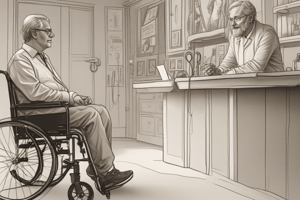Podcast
Questions and Answers
Which model of disability views disability as a form of social oppression?
Which model of disability views disability as a form of social oppression?
- Social Model (correct)
- Biopsychosocial Model
- Charity Model
- Medical Model
Which model focuses on the diagnosis, treatment, and cure of the impairment?
Which model focuses on the diagnosis, treatment, and cure of the impairment?
- Charity Model
- Social Model
- Biopsychosocial Model
- Medical Model (correct)
Which model views disability as a personal misfortune, eliciting sympathy and pity from others?
Which model views disability as a personal misfortune, eliciting sympathy and pity from others?
- Medical Model
- Charity Model (correct)
- Social Model
- Biopsychosocial Model
Which model views disability as the result of an interaction between biological, psychological, and social factors?
Which model views disability as the result of an interaction between biological, psychological, and social factors?
What is a key principle of the Social Model?
What is a key principle of the Social Model?
What is a key principle of the Medical Model?
What is a key principle of the Medical Model?
What is a key principle of the Charity Model?
What is a key principle of the Charity Model?
What is a key principle of the Biopsychosocial Model?
What is a key principle of the Biopsychosocial Model?
What is a fundamental assumption of the Social Model?
What is a fundamental assumption of the Social Model?
Which model of disability is most likely to focus on the individual's experience and perspectives?
Which model of disability is most likely to focus on the individual's experience and perspectives?
What is a key limitation of the Medical Model?
What is a key limitation of the Medical Model?
Which model of disability is most likely to acknowledge the role of psychology in disability?
Which model of disability is most likely to acknowledge the role of psychology in disability?
What is a key advantage of the Biopsychosocial Model?
What is a key advantage of the Biopsychosocial Model?
Which model of disability is most likely to prioritize accessibility and inclusion?
Which model of disability is most likely to prioritize accessibility and inclusion?
Flashcards are hidden until you start studying
Study Notes
Models of Disability
Social Model
- Focuses on the social and environmental barriers that disable people, rather than their individual impairments
- Views disability as a form of social oppression, resulting from the failure of society to accommodate and include people with impairments
- Emphasizes the need for social change and removal of barriers to enable full participation and inclusion
- Key principles:
- Disability is a social construct, not a personal tragedy
- People with impairments are not the problem, but rather the environment and society that excludes them
- Disability is a human rights issue, requiring social justice and equality
Medical Model
- Views disability as a personal tragedy or defect, resulting from an individual's impairment or illness
- Focuses on the diagnosis, treatment, and cure of the impairment, rather than the social and environmental barriers
- Emphasizes the role of medical professionals in "fixing" the individual, rather than addressing societal barriers
- Key principles:
- Disability is a personal problem, requiring medical intervention
- People with impairments are seen as "sick" or "broken" and in need of repair
- Disability is a medical issue, rather than a social or human rights issue
Charity Model
- Views disability as a personal misfortune, eliciting sympathy and pity from others
- Focuses on providing charity and welfare to people with impairments, rather than addressing social and environmental barriers
- Emphasizes the role of benevolent organizations and individuals in "helping" people with impairments
- Key principles:
- Disability is a personal tragedy, requiring sympathy and charity
- People with impairments are seen as objects of pity, rather than as equals
- Disability is a personal issue, rather than a social or human rights issue
Biopsychosocial Model
- Views disability as the result of an interaction between biological, psychological, and social factors
- Focuses on the complex interplay between an individual's impairment, their personal and psychological experiences, and the social and environmental context
- Emphasizes the need for a holistic approach, addressing the individual's physical, emotional, and social needs
- Key principles:
- Disability is a multifaceted issue, requiring a comprehensive approach
- People with impairments have unique experiences and perspectives, shaped by their individual and social context
- Disability is a complex issue, requiring collaboration between medical, social, and psychological professionals
Models of Disability
Social Model
- Focuses on social and environmental barriers that disable people, rather than individual impairments
- Views disability as a form of social oppression, resulting from society's failure to accommodate and include people with impairments
- Emphasizes the need for social change and removal of barriers to enable full participation and inclusion
- Disability is seen as a social construct, not a personal tragedy
- Environment and society are the problem, not the individual with impairments
- Disability is a human rights issue, requiring social justice and equality
Medical Model
- Views disability as a personal tragedy or defect, resulting from an individual's impairment or illness
- Focuses on diagnosis, treatment, and cure of the impairment, rather than social and environmental barriers
- Emphasizes the role of medical professionals in "fixing" the individual
- Disability is seen as a personal problem, requiring medical intervention
- People with impairments are seen as "sick" or "broken" and in need of repair
- Disability is a medical issue, rather than a social or human rights issue
Charity Model
- Views disability as a personal misfortune, eliciting sympathy and pity from others
- Focuses on providing charity and welfare to people with impairments, rather than addressing social and environmental barriers
- Emphasizes the role of benevolent organizations and individuals in "helping" people with impairments
- Disability is seen as a personal tragedy, requiring sympathy and charity
- People with impairments are seen as objects of pity, rather than as equals
- Disability is a personal issue, rather than a social or human rights issue
Biopsychosocial Model
- Views disability as the result of an interaction between biological, psychological, and social factors
- Focuses on the complex interplay between an individual's impairment, their personal and psychological experiences, and the social and environmental context
- Emphasizes the need for a holistic approach, addressing the individual's physical, emotional, and social needs
- Disability is seen as a multifaceted issue, requiring a comprehensive approach
- People with impairments have unique experiences and perspectives, shaped by their individual and social context
- Disability is a complex issue, requiring collaboration between medical, social, and psychological professionals
Models of Disability
Social Model
- The social model focuses on societal barriers that disable individuals, rather than their impairments.
- It views disability as a result of societal oppression and exclusion, rather than a personal characteristic.
- The model emphasizes the need to change society to accommodate people with disabilities, promoting accessibility and inclusion.
- Disability is seen as a social construct, created by societal attitudes and barriers.
- People with disabilities are not inherently "disabled", but rather disabled by society's failure to adapt.
Medical Model
- The medical model attributes disability to an individual's impairment or medical condition.
- It views disability as a personal tragedy or problem that needs to be cured or fixed.
- The model emphasizes the need for medical intervention and treatment to "fix" the individual.
- Disability is seen as a result of individual impairment or medical condition, rather than societal factors.
- People with disabilities are viewed as "sick" or "broken" and in need of repair by medical professionals.
Biopsychosocial Model
- The biopsychosocial model considers the complex interplay between biological, psychological, and social factors that contribute to disability.
- It views disability as a complex issue that cannot be attributed to a single factor.
- The model emphasizes the need for a holistic approach to understanding and addressing disability.
- Disability results from the interaction between biological, psychological, and social factors, rather than a single cause.
- A multidisciplinary approach is necessary to address disability, recognizing that people with disabilities have complex needs beyond just medical treatment.
Studying That Suits You
Use AI to generate personalized quizzes and flashcards to suit your learning preferences.




